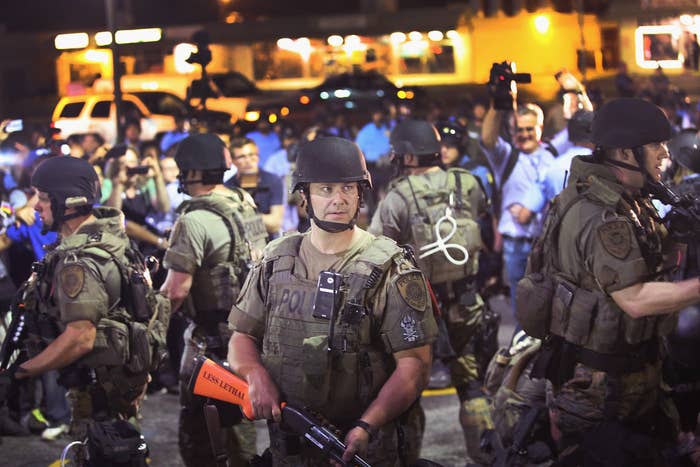
WASHINGTON — More than a month after Ferguson and the debate it sparked over the militarization of local police forces, an internal rift has grown between the nation's top labor federation and one of its own unions.
The International Union of Police Associations, a member of the AFL-CIO, has been largely quiet on the issue of police militarization. But in a couple of open letters the union has shown support for the program that provides police with military-grade weaponry. The AFL-CIO meanwhile has been a vocal supporter of police demilitarization and better oversight. The federation's president, Richard Trumka, even signed a letter to Congress calling for a "federal czar" to oversee police forces.
But despite their differences, IUPA has been reluctant to call out its federation, or even admit how different their views are. IUPA spokesman Rich Roberts told BuzzFeed News that Trumka has consulted with union president Sam Cabral, but wouldn't say the last time they spoke directly or what the conversation entailed. Roberts said Cabral was traveling and he'd been unable to reach him for comment.
"Like any family there are going to be some disagreements here and there, but that doesn't break up the family," Roberts said.
On Thursday, Roberts said the union's legislative director was scheduled to have multiple meetings with the White House and another with the Justice Department. Roberts did not confirm whether the meeting was about Ferguson, police militarization, or another topic. The Justice Department did not return a request for comment on the meetings.
AFL-CIO spokesman Josh Goldstein also said they've had conversations with the union about Michael Brown and the situation in Ferguson, but wouldn't comment further on "internal conversations."
In a letter published Aug. 21, Cabral wrote about the unfair criticism on police officers as a whole as a result of what happened in Ferguson — "[Police officers] are not responsible for the gangs, black on black crime or the infant mortality rate" — but also wrote about the need for police forces to have the equipment they need to combat violence they face on a regular basis.
"As for the militarization of police departments, I believe that law enforcement officers should have available to them all tools necessary to do their job and protect their community," he wrote.
This week, AFL-CIO President Richard Trumka gave a speech to Missouri labor leaders with a decidedly different tone. Focusing on race relations throughout America's history and how there is still work to be done on them today, Trumka said "the answer starts with candor, not firepower."
Roberts, the spokesman for the IUPA, told BuzzFeed News the need varies from department to department, but "when police officers encounter a potentially violent incident, they need as much protection as they can get."
Trumka noted the difficult jobs and daily threats police face, saying they should have what they need to protect those they serve. But the AFL-CIO president also said "we can't militarize police" and pointed to a history of law enforcement turning against their community.
"Let's not forget what our history teaches us, because it's always the employers who want the paramilitary forces, the National Guard, the bayonets, and the armored cars," Trumka said. "And the weapons always end up pointed at us."
Trumka did give a nod to one of IUPA's major talking points when he called for people not to rush to judgement on Darren Wilson, the officer who shot Michael Brown, before all the facts come out.
Though Roberts, the spokesman for IUPA, said the union is no longer going to "engage in public discussion" about Ferguson or police militarization, he said that doesn't mean they aren't working on it behind closed doors.
